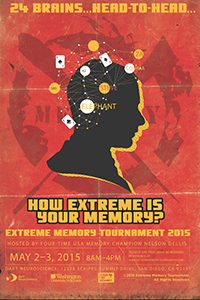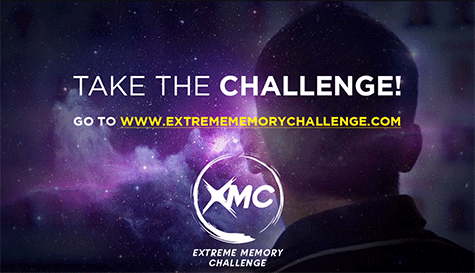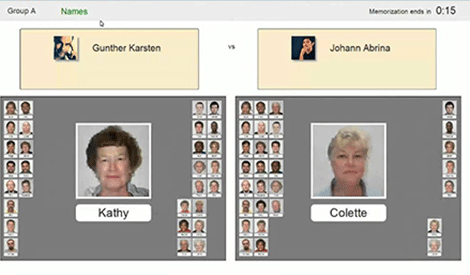Two dozen of the world’s best memory athletes will compete this weekend at the 2nd Annual Extreme Memory Tournament (XMT) in San Diego.
Sponsored by Washington University in St. Louis and San Diego-based Dart NeuroScience, the fast-paced, Internet-enabled competition brings together some of the world’s best memory champs for a battery of head-to-head memory showdowns, including such feats as recalling the precise order for long lists of random words, numbers and playing cards.
Twenty-four athletes will face off, challenge their memories in extreme ways, and possibly win big — with $76,000 in prize money on the line.
The tournament, which is free and open to the public, will be held at the Dart headquarters in San Diego. Last year, about 100 spectators showed up for the first tournament, which was featured in The New York Times.
This year’s matchup includes eight competitors from the 2014 tournament, along with 16 more people who qualified in a series of advance online competitions. The competition runs each day from 8:30 a.m.-4 p.m (PST) and each event will be live-streamed on the tournament website.

Washington University, a hotbed for human memory research, is sponsoring the event in part because a team of its researchers plans to study the contestants to learn more about the cognitive processes and techniques that contribute to their phenomenal memorization and recall skills.
“We are developing a platform to test them remotely via the internet wherever they are in the world,” said Henry L. “Roddy” Roediger, PhD, the James S. McDonnell Distinguished University Professor in Arts & Sciences at Washington University.
“People in Mongolia and in the Philippines are coming up in the competitions and have a good chance of winning now or in the near future. We’re hoping to learn more about how they manage feats of memorization that most people would consider impossible.”
The 2015 contestants group includes Simon Reinhard, a German memory champion who won the XMT event in 2014. He holds the world record at memorizing cards (1 deck in 21.19 seconds). Johannes Mallow, another German and a close friend of Reinhard’s, was second-place finisher in the 2014 XMT. He set the XMT record for numbers in 2014, memorizing a set of 60 random digits in less than 16 seconds.
About the competition
Roediger and colleagues have been working with Dart NeuroScience on related research for years. Dart, which has about 250 employees, is a private company developing new technologies, therapies and drugs to help people maintain and improve cognitive abilities throughout life.

Although the extreme memory project is in its early stages, preliminary findings suggest that the key cognitive skill underlying extreme memory abilities may be the ability to focus one’s attention during the memorization process.
“These competitors are amazing,” Roediger said. “They excel on many memory tasks, especially those that require focused attention. They simply cannot let their minds wander during competitions, and they can use the ability to focus on other cognitive tasks besides those testing memory.”
Most extreme memory athletes, known as mnemonists, use some variation of the same technique, known as building a “memory palace,” which involves mentally placing individual items to be remembered into familiar locations within some visual or mental framework, such as the well-studied location of paintings in an art gallery or the route taken to work every day.
Mnemonists take in new information and store it in images in discrete locations in their memory palace. Later, they mentally move through their locations and call out the images stored in the various places, Roediger said.
“The general principle makes it sound easy, but believe me, it is not,” Roediger said. “For example, one of the competitors, Ben Pridmore, once was able to memorize 28 decks of cards in order after studying them for just one hour. He used 28 memory palaces, but then he had to also remember the order of his use of the memory palaces.”
Among the event organizers is Nelson Dellis, a four-time USA Memory Champion and multiple U.S. memory record holder. Dellis holds the U.S. national record for memorizing a deck of shuffled cards in 63 seconds, as well as the U.S. national record for memorizing the most digits in 5 minutes, with 303 digits memorized.
While those records may seem amazing, Dellis’ worldwide ranking for various memory feats is relatively modest — 15th in the world for card memorization and 24th in the world as an overall memory athlete.

Dellis, Reinhard, Mallow and other extreme memory contestants have visited Washington University in recent years to provide memorization demonstration for students and faculty and to participate in various cognitive tests administered by the university research team.
Roediger is principal investigator on the grant from Dart NeuroScience to support research on people with exceptional memory. Co-investigators include Dave Balota, PhD, professor of psychology in Arts & Sciences and professor of neurology at Washington University School of Medicine in St. Louis; and Kathleen B. McDermott, PhD, professor of psychology in Arts & Sciences. McDermott has a separate grant from Dart to examine neural underpinnings of individual differences in memory ability using functional magnetic resonance imaging.
Mary Pyc, PhD, a researcher at Dart, worked on the project as a postdoctoral research associate in psychology in Arts & Sciences. She now carries much of the responsibility for the XMT event.
Other Washington University faculty and students making the trip to San Diego include research assistant Jeff Berg; postdoctoral researcher John Nestojko, PhD; and graduate student Adrian Gilmore, all in psychology.
“The tournament is not, strictly speaking, a part of our research,” Roediger said. “However, we hope to recruit many of the contestants for our future research, so many of us are showing up for the tournament and are very interested in it.”
